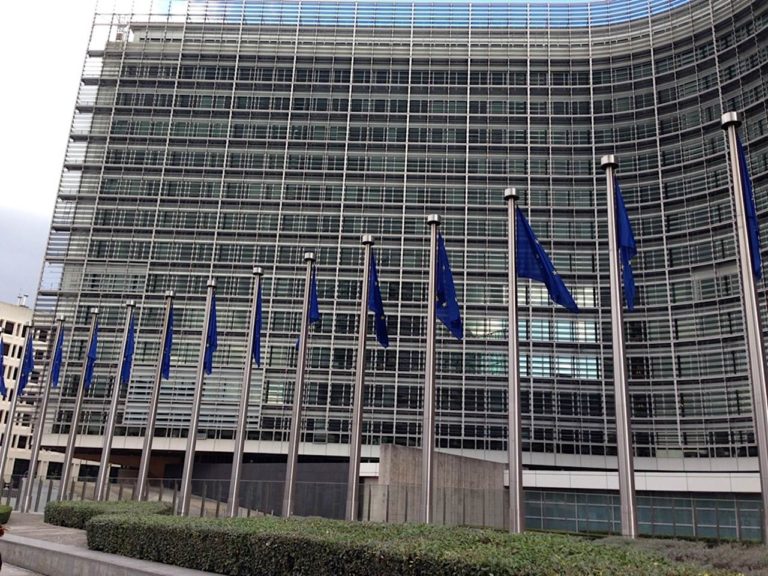Highlights from Last Week
CW 5 / Monday, 27th to Thursday, 30th January: Mini Plenary Sessions Week (Brussels)
United Kingdom: At midnight on 31st January, the UK’s membership of the European Union finally drew to a close. From this point on, the EU will comprise of 27 Member States. By the end of the year, the EU and the UK want to have negotiated a free trade agreement and, at any rate, a transitional period will be in train.
As a result of the withdrawal, the EU Parliament will be reduced in size from 1st February. The number of MEPs will drop from 751 (the maximum number set by the EU Treaty) to 705. Of the 73 British MEP seats, 27 will be redistributed among other Member States and the remaining 46 will be kept free for future EU enlargements.
The three Presidents of the EU institutions availed of last Friday for a meeting and a joint declaration entitled “A new dawn for Europe”.
EU Commission Work Programme: On Wednesday, the EU Commission presented its Work Programme for 2020 (press release). Among other aspects, this contains the following priorities:
A Europe fit for the digital age:
- A new European Data Strategy will enable us to make the most of the enormous value of non-personal data as an ever-expanding and re-usable asset in the digital economy.
- The Commission will also present a White Paper on AI in order to support the development and uptake of AI that respects our European values and fundamental rights.
- A new Digital Services Act will reinforce the Single Market for Digital Services and help provide smaller businesses with the legal clarity and level playing field that they need. The protection of citizens and their rights, not least their freedom of expression, will be at the heart of our efforts.
- Digitalization and cybersecurity are two sides of the same coin. To further strengthen cybersecurity in the Union as a whole, the Commission will review the Directive on the security of network and information systems (NIS Directive).
- Strengthening Europe’s digital leadership and strategic autonomy will require strengthening our industrial and innovation capacities. To support this, the Commission will propose a comprehensive new Industrial Strategy for Europe which supports the ecological and digital transition and which maintains fair competition.
Concrete Initiatives:
| Europe fit for the Digital Age: | ||
| Q1 2020 | Non-legislative | A Strategy for Europe fit for the Digital Age |
| Q1 2020 | Non-legislative | European Data Strategy |
| Q1 2020 | Non-legislative | White Paper on Artificial Intelligence |
| Q1 2020 | Non-legislative | EU Industrial Strategy |
| Q1 2020 | Non-legislative | Single Market Barriers Report |
| Q1 2020 | Non-legislative | Single Market Enforcement Action Plan |
| Q1 2020 | Non-legislative | SME Strategy |
| Q4 2020 | Legislative (tbc) | Proposal on Artificial Intelligence |
| Q4 2020 | Legislative | Digital Services Act |
| Q4 2020 | Legislative | Revision of the NIS Directive |
Promoting our European way of life
- The Commission will present a new EU Security Union Strategy setting out areas where the Union can bring added value to support Member States in ensuring security – from combatting terrorism and organized crime, to preventing and detecting hybrid threats, to cybersecurity and increasing the resilience of our critical infrastructure;
- Feeling secure and having peace of mind is one of the most fundamental and important priorities for Europeans. Nothing can be more important for our way of life than protecting our children. With this in mind, the Commission will present an EU strategy for a more effective fight against child sexual abuse.
| Concrete Initiatives | ||
| Q2 2020 | Non-legislative | A new Security Union Strategy |
| Q2 2020 | Non-legislative | EU Strategy for a more effective fight against child sexual abuse |
| Q4 2020 | Legislative | Strengthening Europol’s mandate |
| Q4 2020 | Legislative | Additional measures for Critical Infrastructure Protection |
A new push for European democracy
| Concrete Initiatives | ||
| Q2 2020 | Non-legislative | GDPR Implementation Report |
| Q2 2020 | Non-legislative | Alignment of EU law enforcement rules with regard to data protection |
| Q4 2020 | Non-legislative | A new Consumer Agenda |
5G toolbox: The EU Commission also presented its 5G toolbox for dealing with the risks associated with the deployment of a 5G network, which includes strategic, technical, and support measures.
According to the toolbox, the following aspects in particular should be included in the risk assessment of a supplier:
- The existence of a strong link between the supplier and the state of a third country;
- The legislation of the third country, especially if there is no legal or democratic control or security or data on this;
- the existence of a protection agreement between the EU and the third country in question;
- the characteristic of the supplier’s corporate property; and
- the ability of the third country to apply any form of pressure, including with regard to the place of manufacture of the equipment.
Platform regulation: Commissioner V. Jourová spoke at an event last week on platform regulation. Regulation of the activities of online platforms is necessary to promote a digital ecosystem that can defend and promote democracy, said the EU Vice-President for Values and Transparency. She referred to measures that could be addressed in the EU’s Action Plan on Democracy, but noted that there could be challenges in distinguishing between paid political advertising and political opinions.
Data Strategy: On 19th February, the Commission will present the European Data Strategy, a draft of which was made public last week. The strategy is based on four pillars:
- Regulations and Rules: Cross-sectoral measures for data access and use;
- Enables: Investment in data and strengthening of European standards, tools and infrastructures for hosting, processing and using data;
- Competences: Investments in general data literacy, addressing lack of skilled labor, up/reskilling of our labor forces as well as dedicated capacity building for SMEs;
- The roll-out of common European data spaces in crucial economic sectors.
Timetables: The IMCO Committee has published/updated the timetables for several INI reports. These include a report on the Digital Services Act.
e-Evidence: In the LIBE Committee, a discussion took place on the further procedure for the e-Evidence Report. The EPP Political Group stressed that its main priorities are lower threshold values and the introduction of a reporting system for European Production Orders (EPOC) for transaction and content data. The Greens and the GUE/NGL supported the general line of B. Sippel, but with an emphasis on higher protection measures, clarity, and legal certainty. The Renew group adopted a more neutral approach and looks likely to be a critical actor in reaching a final compromise between the main groups. MEP Sippel announced that several shadow and technical sessions will start next week with the aim of voting on a compromise text in March (video).
Community standards: Facebook has given scientists direct access to its internal decision-making bodies. Researchers from the Hamburg Leibniz Institute for Medical Research | Hans Bredow Institute (HBI) have investigated how Facebook has developed communication rules for its platform. The results of this pilot study have now been published.
Artificial intelligence: At the Science & Technology Options Assessment (STOA) meeting on the future of AI in Europe last week, Commission Vice-President M. Vestager stressed the need to build trust and confidence in AI in order to realize its full potential and explained the Commission’s intention to develop an ecosystem of excellence (mobilizing research funding to foster innovation and retain talent) and an ecosystem of trust (creating a clear, people-centered regulatory framework with a risk-based approach). Vestager raised a number of issues during Question Time: She advocated a risk-based rather than a sectoral approach, expressed her preference for ensuring proper enforcement of the GDPR rather than revising the regulation, and stressed the importance of close cooperation between the Commission and the Member States in investing in the development and anchoring of artificial intelligence talent, as well as the need to revise existing legislation to ensure transparency and accountability so that consumers can exercise their rights.
Vestager advocated the need for open data spaces and more norms and standards to ensure the availability and usability of data. However, she also stated that the value generated from public data should be returned to the taxpayer. Although innovation should not occur at the expense of core values, Margrethe Vestager believed that both objectives could be achieved, especially in the new environment where companies could actively provide feedback on the Commission’s proposals and ask for regulation.
In contrast to Vestager’s “open approach” to data sharing, Andrea Renda (member of the High Level Group) felt that some data should not be open, in order to maximize its value and protect EU industries. Regarding cooperation with the private sector, Anthony Gooch (OECD) called for an open approach for legislators with (large) private companies that have their own regulatory teams, as they have common interests. He also strongly recommended that EU legislators look at the global picture and work with intergovernmental organizations if the EU wishes to re-enact the success of the GDPR.
EP Think Tank Publications:
- Plenary round-up – Brussels, January II 2020
- Economic and Budgetary Outlook for the European Union 2020
- Single market, innovation and digital: Heading 1 of the 2021-2027 MFF
- The von der Leyen Commission’s priorities for 2019-2024
- EU Agencies and Conflicts of Interests
Highlights of the Coming Week
CW 6 / Monday, 3rd to Thursday, 6th February: Political Group and Committee Meetings (Brussels)
You can find a list of the upcoming dates of the European Parliament here. You can find an overview of the most important dates of the Council’s week here and its meeting calendar here.
A number of Council and Working Party meetings will be taking place this week.
- An informal meeting of Ministers for Competitiveness (Tuesday, Wednesday);
- Horizontal Party on Cyber Issues (Tuesday, with topics including the Cybersecurity Research Center);
- Working Party on General Affairs (Friday).
Meetings will also take place this week of Coreper I (Wednesday) and Coreper II (Wednesday).
Information on the weekly Commission meeting can be found in the preview or (shortly beforehand) in the current agenda. The topics proposed for the coming meeting are:
- Enlargement methodology
- Economic Governance Framework Review
LIBE Committee (EP)
Current Meetings
- 6th February 2020, 9.00-12.30 and 14.00-17.30 (Brussels)
Excerpts from the draft agenda
6th February 2020, 9.30 – 10.00
Item 4: LIBE Mission to the EU Agency for the Operational Management of Large-Scale IT Systems in the Area of Freedom, Security and Justice (eu-LISA), Tallinn, Estonia, 29-30 October 2019
LIBE/9/02331
- Presentation of a draft mission report
Further Meetings (Calendar)
- 19th February 2020, 9.00-12.30 and 15.00-18.30 (Brussels)
- 20th February 2020, 9.00-12.30 and 14.00-17.30 (Brussels)
IMCO Committee (EP)
Current Meetings
- none
Further Meetings (Calendar)
- 17th February 2020, 14.30-18.30 (Brussels)
- 18th February 2020, 9.00-12.30 and 14.30-18.30 (Brussels)
Excerpts from the draft agenda
17th February 2020, 15.00 – 17.00
…
Public hearing
Item 4. Digital advertising and consumer information
18th February 2020, 9.45 – 12.30
With the Commission
Item 8. Third annual review of the functioning of the EU-U.S. Privacy Shield
…
18th February 2020, 14.30 – 16.00
With the Commission
Item 10. Exchange of views with Mrs. Gertrud Ingestad, Director general of DG DIGIT, on supporting the digital transformation of European public administrations in Member States
JURI Committee (EP)
Current Meetings
- none
Further Meetings (Calendar)
- 17th February 2020, 15.00-18.30 (Brussels)
- 18th February 2020, 9.00-12.30 and 14.30-18.30 (Brussels)
ITRE Committee (EP)
Current Meetings
- none
Further Meetings (Calendar)
- 17th February 2020 (Brussels)
- 18th February 2020 (Brussels)
CULT Committee (EP)
Current Meetings
- none
Further Meetings (Calendar)
- 19th February 2020, 9.00-12.30 and 15.00-18.30 (Brussels)
- 20th February 2020, 9.00-12.30 (Brussels)
Further Parliamentary Calendar Dates
- CW 7 / Monday, 10th to Thursday, 13th February: Plenary Sessions (Strasbourg);
- CW 8 / Monday, 17th to Thursday, 24th February: Committee Meetings (Brussels);
- CW 9 / Monday, 24th to Thursday, 28th February: Green Week (no meetings).




